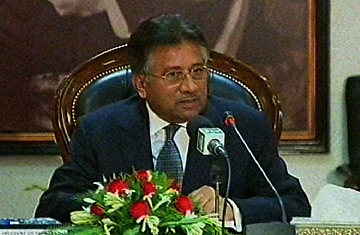
Pakistani President Pervez Musharraf during a meeting of the National Security Council in Islamabad November 8, 2007
After increasing pressure from both the international community and his own people, Pakistani President General Pervez Musharraf announced today in Islamabad that elections would be held before February 15, and that he would soon be doffing his controversial military uniform. If the country didn't exactly erupt into shouts of jubilation, there was certainly a collective sigh of relief, as the announcement presages an end to a draconian regime of martial law that has plagued the country since Saturday. The White House responded with praise — "We think it is a good thing that President Musharraf has clarified the election date for the Pakistani people," White House spokeswoman Dana Perino said. But former Prime Minister Benazir Bhutto opted for a wait-and-see attitude. "We don't want vague and generalized statements," she told a press conference on the eve of a massive anti-emergency rally planned for Friday. "We want up-front answers."
While Musharraf was ready to make firm a date for parliamentary polls that would see the election of a new Prime Minister — a position most Pakistanis assume will be filled by the popular Bhutto — he was less definitive about when, exactly, he was planning to step down as chief of Pakistan's army.
For the past eight years Musharraf, who took power in a 1999 coup, has run the country as both President and general. That straddling of both offices — which many say contravenes Pakistan's constitution — was challenged in October when Musharraf won a second term as President with 98% of the vote in an election that was boycotted by the opposition. Musharraf had promised that he would step down as general before he was sworn in as President. But a Supreme Court ruling on the legitimacy of that election was still pending, and the court ordered that Musharraf could not be declared the winner — and thus be sworn in — before it came to a decision. Musharraf, apparently, wasn't willing to wait. On Saturday Musharraf declared emergency rule, sacked the Chief Justice, put the other justices under house arrest and shut down the country's independent television stations. While Musharraf announced that emergency law was necessary to contain the spread of extremism, his government's crackdown on lawyers, human rights campaigners, judges and media made it clear that his real target was a civil society and a judiciary willing — and increasingly able — to challenge his power.
When asked about stepping down as army chief after today's announcement, Musharraf repeated the presiding judge's order not to announce the election results, and said that he would remove his uniform and take oath of office when the Supreme Court came to its decision. Never mind that a new Supreme Court has been hastily cobbled together from a gallery of judges willing to sign what amounts to an oath of allegiance to the government, while more than half of the original court languish under house arrest.
Bhutto, exhibiting a newly discovered resolve vis-à-vis Musharraf, with whom she had hoped to reach a power-sharing deal, declared his announcement insufficient, and demanded that he remove his uniform immediately. She said Musharraf should release the original judges and let "the real Supreme Court" decide on his legitimacy. "We will accept the decision of that Supreme Court, which will be constitutional and includes those judges who are detained," she said. Up until now, Bhutto has avoided all references to Pakistan's judiciary, focusing instead on elections and a call for civilian rule.
Some critics point out that Bhutto, who was awaiting a ruling on the constitutionality of an amnesty bill that would have absolved her from longstanding corruption charges, would have been perfectly content with Musharraf's more docile Supreme Court 2.0. But the people of Pakistan have grown to love their independent judiciary. Protests against Musharraf's emergency rule have been dominated by the country's black-suited lawyers, who have garnered immense respect for their tireless campaign for rule of law and a civilian President. Bhutto, it seems, has been forced to respond to the demands of her people over pursuing her own interests. Musharraf may have announced elections, but Bhutto is starting to understand democracy.
